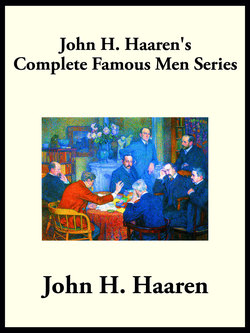Читать книгу John H. Haaren’s Complete Famous Men Series - John H. Haaren - Страница 6
На сайте Литреса книга снята с продажи.
Deucalion and the Flood
ОглавлениеUpon Olympus there was for every god a shining palace of brass, built by Vulcan and the Cyclops; and every day the gods gathered in the great banqueting hall of Jupiter to feast upon ambrosia and drink nectar from goblets of gold.
At the banquets they were served by a lovely maiden named Hebe, who was the goddess of youth. While they feasted Apollo played on his lyre and the Muses sang. The muses were the nine goddesses of poetry, arts, and sciences. Even in our own language playing and singing are called “music” in memory of them.
Sometimes the gods came down from Olympus to visit the men in Greece and taught them what we call the “useful arts.” Minerva, the goddess of wisdom, showed them how to harness horses and plow the ground. She showed the women how to spin and weave.
Ceres, the great earth-mother who made the fields fruitful, showed the farmers how to sow wheat and barley. Then, when the grain was ripe, she taught the farmers’ wives how to make bread.
Vulcan taught the Greeks how to make plows, spades and hoes and many other things of iron and brass.
When the gods came down now and then from Olympus they found that the early Greeks were very wicked. The kindness of the gods made them no better; so at last Jupiter decided to destroy them by a flood.
A certain half-god, half man, named Prometheus, or Forethought, warned the Greeks of their danger. The only person that heeded his warning was his own son, Deucalion. With Pyrrha, his wife, Deucalion got into an ark as soon as the rain began.
It rained all over Greece for days and days. The rivers and brooks overflowed. The valleys were filled. The trees disappeared. All but the highest mountains were covered. But Deucalion’s ark rode safely. At last the rain ceased. For nine days the ark drifted about on the face of the water. Then it grounded.
When the waters had gone down somewhat, Deucalion and Pyrrha found that they were on one of the mountains of Greece, called Parnassus. They left their ark and walked down the mountain. Of all the Greeks only these two were left; and among the quiet hills and valleys near or far not a living creature was to be seen. The loneliness made them fearful. Scarcely knowing whither they went, they came suddenly upon a deep cleft in the rocks. Out of the cleft dense volumes of steam and gas were pouring. Deucalion, who was braver than his wife, peered into the cleft; and while he did so, a wonderful voice came from the depths.
It said, “Cast behind you the bones of your mother!”
“An oracle!” cried Pyrrha.
“An oracle it is!” Deucalion cried.
Long ages before the flood, the gods used some times to speak with men and give them advice about things that were going to happen. What they said was called an “oracle,” a word that means something told by the gods to men.
So now Deucalion and Pyrrha felt sure that one of the gods was telling them something.
But they wondered what the words “Cast behind you the bones of your mother” could mean. After a while Deucalion said:
“Pyrrha, the earth is our mother.”
“Very true,” said she.
“Then,” cried Deucalion, “the bones of our mother must be the stones of the earth.”
Both now saw plainly that the oracle meant that they should cast behind them the stones that lay scattered upon the ground. So they went on down the mountain, and as they went they picked up stones which they cast behind them.
Soon they heard the clatter of many feet behind them, and looking back they saw that the stones which Deucalion had thrown had turned into a troop of young men, who were following Deucalion, while the stones that Pyrrha had thrown had become a band of girls, who were following Pyrrha.
Deucalion and Pyrrha were no longer lonely; and they had plenty to do for they taught the youths and maidens the arts of plowing and spinning and weaving that they themselves had learned from the gods before the flood.
Stones lay thick on the face of the land, and the hills were covered with forests. With the stones walls were made, and with timber from the forest roofs and floors were laid, and thus houses were built. Farms were then laid out, fields were sown, and vines and olive trees planted. Soon the valley below Mount Parnassus was crowded with many people. In time the race of Deucalion and Pyrrha spread from valley to valley, up and down the land of Greece.
The people called themselves Hellenes, because one of the sons of Deucalion was named Hellen. Their country, which, as you have learned, we call Greece, they called Hellas.
